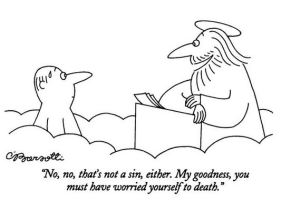
My Copilot, Bob
I had a terrible road rage problem. I shouted, I gestured, I scowled. I used bad words. I am embarrassed to admit that once in a great while, I flipped someone the bird. And these things sometimes happened while my preteen was riding in the car with me. I feel ashamed to think back on it, but I want to share the truth of it because where this story ended up had a powerful lesson in it.
Much of this rage happened because my Mama Bear instinct got triggered in wanting to keep the kiddo safe – that is, responses to unsafe behaviors of others like tailgating, cutting me off, distracted driving. But, that didn’t account for all of my rage. Some was just plain indignation and refusal to accept things as they are: “How dare they?” or “It’s not your turn!” or “Why do I try so hard to be careful and courteous when it feels like so few other drivers are?!”
There was also some very emotional baggage connected to being in the car. Fear, grief, and anger related to long ago events in cars. Primarily, it was about a car accident before I was born that paralyzed my grandmother and robbed her of walking and most of her communication. Then, the same week that grandmother died, when I was 14 years old, a a good friend my age died in a car accident. Riding or driving on highways has always scared me to some degree. Luckily, the fear is usually more of a low-level buzzing rather than full-on screeching. For some reason, changing lanes is the scariest; when I must do it, I check many, many times and then brace myself.
Point is, although there may be some understandable reasons for over-the-top reactions to to others driving badly, the facts remained that a) overreacting didn’t help these situations (and in fact, the adrenaline rush probably degraded my judgement); and, b) I was ashamed of how I acted in front of the youngster. It wasn’t the way I’d want her to behave as a driver.
The turning point came one day when I swore and threw my hands up in disgust at another driver, and my daughter gave me feedback. I can’t remember exactly how she phrased it, but she made it clear, in a respectful way, that reactions like this made her uncomfortable when she rode with me. She also said that my reaction was beyond what that situation warranted. I was still seething but luckily I could take a step back and not turn the anger on her. I didn’t snipe. I knew she had a right to express her opinion and feel comfortable in the car. I may be driving, but it was her ride, too. I apologized, and let it be for the moment. I remember thinking, this is how I am, how I’ve always been, and it’s won’t change. She may have to get used to it.
A few days later I tearfully explained to my daughter about what had happened to my Nana and my friend Jenn, and how these events still made me feel scared and angry when other drivers drove badly. She told me it was sad to hear these details, but that it helped her to understand where I was coming from and why driving was so fraught for me. She otherwise knew me as a reasonable person without much of a temper, so “Driver Mom” had seemed a whole different person to her.
After that, I thought. A lot. About her feedback; about the person I wanted to be vs. who I was being; about what qualified as in my control; about being a role model. And though my pattern of behavior behind the wheel had been etched for over 25 years, I decided I needed to try my best to change.
I thanked my daughter for the honest opinion she had given me. I acknowledged that it can’t have been easy – she took a risk that I might get mad at her. But it turned out to be critical for me to know how my behavior affected her.
After that, I came up with the following approach – it was highly personal and so I realize it might not work for many folks – but in case any of it may be helpful, here it is:
1) I acknowledged that the root of my reactions was a negative baseline perspective of others driving. I saw them as opponents or potential nemeses, which set me up to expect the worst of them, all the time. Even if it wasn’t going to be true, I needed to find a way to make that baseline perspective of others to be neutral, or maybe even positive. It would also be important for me to separate actions from people – that a deed doesn’t define someone’s whole being. I went with the phrase “friends” to associate with other drivers – sure, kind of touchy-feely, but I need big ammunition to counteract my views. So instead of, for instance, “What an @$$hole!“, I’d say aloud, “Sometimes our friends on the road don’t make good choices.” This acknowledged that something frustrating happened, but didn’t get me keyed up and leave me with such angry, hopeless feelings. It was goofy, but it worked for me.
2) I took it a day at a time only. If I got through a day without a bad outburst, I put a quarter in a jug. It was fun to see the stash grow, although this particular approach only last a month or two because I don’t usually have change and it became a pain to get ahold of change to do this. But in the beginning it was a good tangible way to see my progress!
3) I considered what was calming to me, and realized one clear winner is the painter Bob Ross. His voice has always soothed me, and his gentle way and encouraging messages hearten me. So, I printed a big ol’ picture of him in his Afro glory, smiling and painting a beautiful landscape and taped it to my glovebox. He has become my soothing copilot. Glancing at Bob does help calm me! Sometimes I chat with him a little, too. I’ve gotten all sorts of positive reactions when people see my Bob Ross pic – from friends and strangers. It’s been fun and surprising to see how many of the younger generation know Bob – maybe from You Tube?
My daughter is more comfortable riding with me these days. She told me she is proud that I’ve worked so hard to change how I act behind the wheel. I’m proud of me, too. I have occasional slips but that’s ok – it’s nowhere near the intensity and frequency it once was. But I showed her that her opinion matters even if she’s a kid, and that even older folks can learn to make a big change if they want to badly enough.

